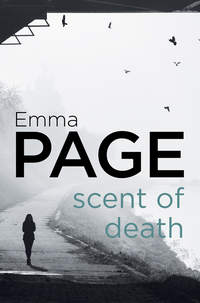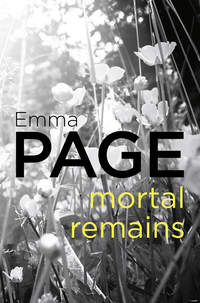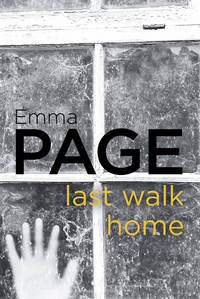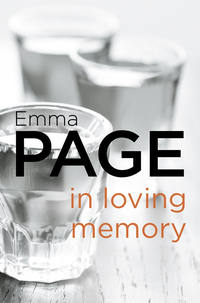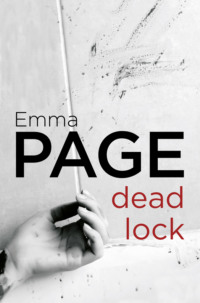
Полная версия
Cold Light of Day


COPYRIGHT
Harper An imprint of HarperCollinsPublishers 1 London Bridge Street London SE1 9GF
www.harpercollins.co.uk
First published in Great Britain in 1984 by Collins Crime
Copyright © Emma Page 1984
Emma Page asserts the moral right to be identified as the author of this work
A catalogue copy of this book is available from the British Library.
This novel is entirely a work of fiction. The names, characters and incidents portrayed in it are the work of the author’s imagination. Any resemblance to actual persons, living or dead, events or localities is entirely coincidental.
All rights reserved under International and Pan-American Copyright Conventions. By payment of the required fees, you have been granted the nonexclusive, nontransferable right to access and read the text of this e-book on-screen. No part of this text may be reproduced, transmitted, downloaded, decompiled, reverse-engineered, or stored in or introduced into any information storage and retrieval system, in any form or by any means, whether electronic or mechanical, now known or hereinafter invented, without the express written permission of HarperCollins e-books.
HarperCollinsPublishers has made every reasonable effort to ensure that any picture content and written content in this ebook has been included or removed in accordance with the contractual and technological constraints in operation at the time of publication.
Source ISBN: 9780008175863
Ebook Edition © MARCH 2016 ISBN: 9780008175870
Version [2016-02-18]
CONTENTS
Cover
Title Page
Copyright
Chapter 1
Chapter 2
Chapter 3
Chapter 4
Chapter 5
Chapter 6
Chapter 7
Chapter 8
Chapter 9
Chapter 10
Chapter 11
Chapter 12
Chapter 13
Chapter 14
Chapter 15
Chapter 16
Chapter 17
Chapter 18
Chapter 19
Chapter 20
About the Author
By Emma Page
About the Publisher
CHAPTER 1
The wind had veered in the night and blew now soft and warm from the south. In the garden of Manor Cottage, three-quarters of a mile from the village of Littlebourne, the snowdrops were out; fat spears of daffodils were pushing up under the ancient apple trees.
The garden was large and rambling and had stood neglected for some years before the Pictons bought the property eighteen months ago. The garden was enclosed on three sides by an old wall of rose-red brick, mantled with ivy. Here and there a self-sown tree had sprung up in the shelter of the walls and stood now strong and established. The Pictons’ daughter, Emily, their only child, climbed the trees summer and winter, made her dens among the branches, perched up there unseen, watching folk walk by along the road to Littlebourne, or a car going past in the other direction to Cannonbridge, five miles to the south-west.
In the cottage kitchen, cosy from the heat of the old solid-fuel stove, restored now and refurbished, the Pictons were finishing breakfast. All three of them wore Fair Isle jerseys painstakingly hand-knitted by Mrs Picton.
Emily sat opposite her father. She was nine years old, short and sturdily built, with a bright darting eye and a look of lively curiosity. She finished her porridge and began to fold her table napkin.
‘Is that all you’re going to eat?’ Leonard Picton said with reproof.
‘I have to be at school early.’ She assumed an air of importance. ‘I have to give out paper for the geography test.’
Leonard glanced at the clock. ‘You’ve plenty of time. Finish your breakfast properly.’ Emily unfolded her napkin again and cut herself a slice from a densely-textured wholemeal loaf; she spread it with butter and honey.
On a shelf of the dresser a radio recited its morning litany. Leonard gave it half an ear as he ate his coarse porridge of mixed whole grains, filling and sustaining, with an agreeable nutty taste. He was a spare, bony man in his middle forties with sharp features, thin fair hair receding at the temples, long, straggling side-whiskers. He taught history at the College of Further Education in Cannonbridge.
He glanced across at his wife who was standing by the stove, staring out through the window. ‘Any more coffee?’ he asked.
Olive came out of her thoughts. She picked up the jug that was keeping warm on the side of the stove and carried it to the table. She poured the coffee, fragrant and dark, made from a mixture of roasted barley and dandelion roots. Her hands were red and rough, marked and scarred from old scalds and burns, cuts and blisters.
She was a plain woman, a few years younger than her husband. Her figure was thin and angular. She wore no make-up and her hair, a nondescript brown already tinged with grey, was drawn severely back into a scanty bun.
She was just entering the streaming stage of a cold; her husband and daughter were more or less over theirs. Not that any of them referred to the ailment as a cold, the Pictons didn’t believe in colds. They spoke of the body’s attempt to throw off accumulated poisons, they dosed themselves with herbal concoctions and fruit juices. But however they referred to it and however they treated it, the malady seemed to affect them in very much the same way as less enlightened sections of the populace.
In the middle of the radio’s calm recital of slowdowns and hold-ups, lay-offs and lock-outs, run-downs and snarl-ups, Leonard’s ear caught the words Wall Street. He sat arrested in the act of lifting his cup to his lips and listened with fixed attention. He began to frown fiercely. An overnight fall in Wall Street, sudden and sharp, acute concern in Tokyo, fears in London of what the day might bring.
Olive slid a sidelong glance at her husband. He drained his cup and banged it down on its saucer. He began to chew the inside of his lips, to make a series of grimaces, staring down at the tablecloth with its bold pattern of blue and white checks.
‘Is that bad?’ Emily asked with sharp interest. ‘When Wall Street falls?’
He jerked his head up. ‘It’s bad for me. But there are plenty of folk that’ll make a fancy profit out of it.’ He frowned even more fiercely. ‘At my expense – and the expense of others like me.’
Olive gave a sudden violent succession of sneezes and dabbed at her nose. ‘More coffee?’ she asked but Leonard shook his head. He pushed back his chair. Time to be gathering up his books and papers, pumping up his tyres. All three of them rode bicycles; Leonard regarded the private motor-car as the invention of the devil.
Emily folded her napkin again and jumped up from the table. She ran cut of the kitchen and up the stairs to her bedroom. She ran a comb through her long tawny hair, gleaming from regular washing in rainwater drawn from the butt outside the back door. She tied her hair back with a ribbon and tugged on a woollen cap. No need for a scarf on this fine morning, so mild for late February.
As she thrust an arm into the sleeve of her anorak her keen ears caught a sound, the gate of the adjacent property, Eastwood, singing under the touch of a hand. Mrs Cutler, most probably, the Eastwood daily woman, arriving for her morning stint. But it was just possible it might be someone else, some harbinger of novelty or excitement.
She darted across to the window overlooking the front garden and the road, and saw that it was indeed Mrs Cutler, plump and puffing after her ride from the village. She had dismounted from her ancient bicycle and was wheeling it up the Eastwood drive.
Emily picked up her satchel and ran downstairs. Her father had vanished about his own concerns but her mother came with her to the door and stood for a moment administering her usual hotchpotch of reminders and admonitions.
Emily nodded energetically to register hearing and heeding. She sprang on her bicycle and rode off down the garden path. She jumped off to open the gate and then with a last wave sprang on again and sped away up the road towards Littlebourne school.
In the garden next door Mrs Cutler didn’t bother hoisting herself up again on to her bicycle in order to negotiate the drive. She had reached an age at which it was less trouble to push the bike up to the house than to jerk herself on to the saddle for the sake of a few minutes. There was no rush. Her employer, Mr Elliott, was an easy-going young man, a bachelor, thank goodness, far easier to work for than any married woman with a falcon eye for dust and smears of grease – and the married woman’s habit of glancing at the clock when the door opened to admit her cleaning woman.
Take it all round, Mrs Cutler thought, by no means for the first time, Mr Elliott and I suit each other very well. The best part of a year now since she’d started working at Eastwood; he didn’t bother her and she didn’t bother him. She’d worked for enough finicky and whimsical employers in her time to be keenly appreciative of that, to know its rarity and value.
Fifteen years now since her husband had died, five years since the last of her children left home. She was as happy and contented as she had ever been, certainly as well-off. No tetchy husband to run round after, no sulky, uncooperative teenagers to argue with. She moved her head in satisfaction at the thought.
She reached the house, a handsome Edwardian dwelling, and wheeled her bicycle round to the rear; she propped it up inside a garden shed.
Gavin Elliott was upstairs in the bathroom when he heard Mrs Cutler let herself in at the back door. She didn’t have a key; Gavin unlocked the door for her when he first went downstairs in the morning.
He peered at his face in the mirror above the washbasin. His skin was always pale but this morning it looked even paler than usual, in marked contrast to the blue-black of his hair, thick glossy hair he had inherited from his mother. He had a slight headache but he scarcely registered that; he often woke in the mornings with a mild headache. He was in the habit of drinking a fair amount of wine with his dinner, followed by brandy, a glass or two of whisky later. He stuck out his tongue before the mirror, pulled a face and measured himself a dose of health salts which he drank at a single gulp.
Back in his bedroom he pulled on the jacket of his dark, conservatively cut suit. He was tall and slimly built, and looked even slimmer in his business clothes. He was thirty-one years old, head now of the family firm of Elliott Gilmore, investment brokers and financial consultants, which had its main office in Cannonbridge. He had inherited the business three years ago on the death of his father, Matthew Elliott.
He paused in front of the wardrobe mirror and adjusted the set of his jacket, picked up a clothes brush and passed it over the fine smooth cloth. His father had been a stickler for a smart businesslike appearance, in his own person as well as in the person of everyone he employed, and Gavin, who had loved and admired his father, adhered to the old tenets. He crossed to the dressing table and took his wallet, his watch and keys from a small drawer.
His head was beginning to feel better. He went rapidly downstairs, calling out a cheerful greeting to Mrs Cutler, a ritual enquiry after her health, as he went into the kitchen to snatch a piece of crispbread and swallow a cup of coffee. Mrs Cutler was busy in the sitting room but he didn’t bother to stick his head round the door, nor did she bother to come to the sitting room door to answer him.
‘I’m all right,’ she called back, ‘but I don’t know for how long. I reckon I’m starting one of these nasty colds that are going round, I’ve got a bit of a throat this morning.’ She continued to work as she spoke. She removed a little porcelain group from the top of a Georgian bureau and set it carefully down, out of harm’s way. She began rubbing vigorously at the mahogany surface with a chamois leather. There were a lot of nice things in the room and in the house generally; she liked that, she liked working among nice things, enjoyed keeping them looking their best.
She carefully dusted the group – a shepherd and shepherdess with a pair of lambs at their feet – and replaced it in its correct position. Mr Elliott had inherited a lovely lot of porcelain from his mother, she seemed to have made a hobby of collecting it, but unlike some folk Mrs Cutler had worked for, who kept everything valuable locked away in cabinets, young Mr Elliott kept his treasures openly on display, to be enjoyed every day by himself and others.
She stood back and looked critically at the bureau, gave a nod of satisfaction and turned her attention to a Regency card table. She rubbed assiduously at the beautiful dark-veined rosewood; she knelt to deal more effectively with the intricately carved base, every line of her short stubby figure expressing energetic dedication to the task of bringing up the soft mellow shine. Her cheeks took on a rosy glow, her iron-grey hair began to stick stiffly out in wisps.
She paused for an instant as the phone rang in the front hall, then she resumed her vigorous polishing; it wasn’t her duty to answer the phone when Mr Elliott was in the house.
In the kitchen Gavin swiftly despatched the last fragments of his crispbread and drained his coffee before going at a rush into the hall to pick up the receiver. He smiled as he recognized the high girlish tones at the other end.
‘Charlotte! Hello!’ he said with pleasure. He had met Charlotte Neale at a charity ball in the late autumn. She seemed to like him and he was quite certain he liked her. This could be the one, he’d decided almost at once – but take it easy, my lad, he’d told himself, don’t rush it, don’t wreck your chances at the start.
‘This is just to let you know I definitely am off to Switzerland next week,’ Charlotte told him. She was eighteen years old, the daughter of an old county family. Her father owned racing stables; he was well known as a sound judge of horseflesh and the breeder of some notable bloodstock. ‘I’m off on Wednesday,’ she added. There had been some talk of Gavin taking her to a race meeting the weekend after next. ‘Sorry I won’t be here for it,’ she said. She was spending a few weeks with an old school friend and her family near Arosa.
‘We could have dinner one evening before you go,’ Gavin suggested. ‘Monday or Tuesday?’ They settled on Tuesday. ‘But I mustn’t be late getting back,’ she told him. ‘I’ll have to be up very early on Wednesday to catch the plane.’ The Neales lived at Berrowhill Court, seven or eight miles from Littlebourne.
Gavin glanced at his watch as he replaced the receiver. Time he was making tracks, it wouldn’t do to be late at the office. He scrupulously followed his father’s habit of always setting a good example, being at his desk spruce and ready to deal with business at the beginning of the day.
He didn’t give Mrs Cutler any directions about her work before he left the house. She had been with him long enough to know what was needed. He had bought Eastwood after his father died, moving in some two and a half years ago. In the first eighteen months he lived there, before Mrs Cutler came to work for him, he had endured a succession of unsatisfactory daily women. He knew his luck in finding Mrs Cutler and he intended to hang on to her.
She came out of the sitting room as he opened the front door. ‘Look after that throat,’ he said. ‘We don’t want you falling ill.’
She followed him outside to shake her dusters. ‘Oh, I’ll be all right,’ she said cheerfully. ‘I’ve got some lozenges to suck.’
Gavin walked round the side of the house towards the garage and backed his car out. As he drove down to the front gate he saw with irritation that his neighbour, Leonard Picton, was standing outside the gate, stiff as a ramrod, clearly waiting to speak to him.
Gavin made a sound of exasperation. He was beginning to find Picton a damned nuisance. When Gavin bought Eastwood, Manor Cottage stood empty. A year later the Pictons bought the cottage and Gavin went out of his way to be helpful and friendly to them. Picton had bought the property at a bargain price and he had a good slice of capital left over from the sale of his previous house; for the first time in his life he had money to invest.
He learned in the course of a casual chat in the roadway that Gavin was the head of a firm of investment brokers and he asked Gavin’s advice about the investment of his capital – on a purely friendly, neighbourly level. And Gavin, on a purely friendly, neighbourly level, advised him – without the scrupulous care he would have given the matter if Picton had presented himself in the ordinary way as a client at the Cannonbridge office of Elliott Gilmore.
Always a man with a keen nose for a bargain, Picton was delighted with this free picking of Gavin’s brains. He instructed his bank without delay to buy the stocks Gavin had suggested.
At first he was delighted with his purchases. Whenever he looked at the financial pages he found his stocks were steady or rising. Until a few months ago. Then they began to fall. He couldn’t understand it, he was horrified. He waylaid Gavin in the road.
‘No need to worry,’ Gavin told him cheerfully. ‘Always a bit of a gamble, the market, full of whims and moods. Just hang on, you’ll find your shares will recover.’
But they hadn’t recovered, they had continued to slide. Picton waylaid Gavin again. ‘It’s only a hiccup in the market,’ Gavin assured him. ‘You didn’t buy in order to make a quick profit, they’re a long-term investment. Forget them for four or five years. You’ll be pleasantly surprised when you look at them again then.’
But Picton couldn’t or wouldn’t forget them. He continued to study the financial pages and the market continued to hiccup; the hiccups grew more violent. Picton’s anxious enquiries turned to frowns, reproaches, finally to outright accusations of professional negligence. Gavin heartily wished he had never opened his mouth in the matter. The man was an idiot, he should have put his money in a building society and slept at nights; he didn’t have the temperament for anything more adventurous.
There’s nothing more I can say to him, he thought now with weary resignation as he approached the gate with Picton planted firmly at the other side. He halted the car and stepped out on to the gravel. He bade Picton a civil good-morning and made to open the gate. Picton clung resolutely to it with both hands.
‘Oh no you don’t,’ he said. ‘You’re going to stand there and listen to what I’ve got to say.’ Gavin made no reply. He stood in a posture of total neutrality, his face wiped clear of expression.
‘You’ve heard the news this morning,’ Picton said with fierce intensity. Gavin shook his head. He hadn’t listened to the radio and the village shop no longer delivered newspapers. ‘Wall Street,’ Picton added, seeing Gavin’s uncomprehending look. ‘Another slide, even bigger.’ He darted his head forward suddenly, still maintaining his hold on the gate. Gavin couldn’t prevent himself from stepping back a pace. ‘It’s not good enough,’ Picton said on a louder note. ‘You’ll have to recompense me. For every penny I’ve lost.’
Gavin expelled a long breath of exasperation. He had already explained to Picton that he – and certainly not the firm of Elliott Gilmore – was in no way legally responsible for the success or failure of Picton’s investments. He had also tried to make him perceive that a loss is never a loss until the stocks are sold. He most assuredly didn’t intend to waste more time and energy going over the same ground again. He made a sudden lunge at the gate and managed to snatch it from Picton’s grasp; he swung it open. He got swiftly back into his car and set it in motion, half expecting Picton to rush over and slam the gate shut again. But Picton made no move, he stood his ground. Gavin had a horrid notion that he wasn’t going to budge, that he would be compelled to get out of his car again and manhandle him out of the way. He continued to inch the car forward.
At the last moment Picton suddenly stepped aside and Gavin was out through the gate. He felt a strong inclination to keep going and let the gate stand open till Mrs Cutler left. But Picton would undoubtedly see that as some kind of victory, so he halted the car and walked briskly back.
‘Don’t kid yourself this is the last you’ll hear of it,’ Picton said as he came up. ‘I’ll see you pay for what I’ve lost. One way or another.’
Конец ознакомительного фрагмента.
Текст предоставлен ООО «ЛитРес».
Прочитайте эту книгу целиком, купив полную легальную версию на ЛитРес.
Безопасно оплатить книгу можно банковской картой Visa, MasterCard, Maestro, со счета мобильного телефона, с платежного терминала, в салоне МТС или Связной, через PayPal, WebMoney, Яндекс.Деньги, QIWI Кошелек, бонусными картами или другим удобным Вам способом.



